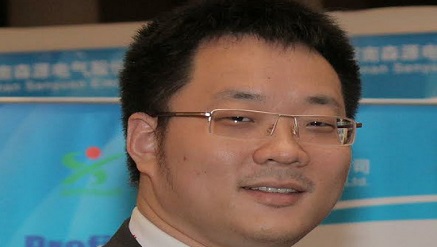General News
Huawei Committed to Better Connected Nigeria, Skills Dev- Li

Qualitative health and education as critical sectors of Nigerian economy can be raved up with technologies, especially now the country is transforming to a digital economy.
Huawei as a company believes that with continued support from the Government, ICT industry will continue to transform other sectors, said Mr. Frank Li, managing director of Huawei Technologies Company Nigeria Limited, in an interview with Nigeria CommunicationsWeek, during the commissioning of Huawei Customer Solution Innovation & Integration Experience Centre in Lagos, recently.
e-Education
“Education, for example we saw a lot of teachers are limited by facilities at their disposal. Knowledge is out there they would want to share from others in developed economies, but it has not been easy for them.
This is part of reason we established innovation and experience centre in Lagos. The digital platform offers users connectivity to technologies and innovations across the globe.
This platform also enables the user to have first-hand practical know-how about their field and even exchange their own ideas, thought, visions and motivations with the outside world. Looking at some rural areas; the classrooms, it is not easy for our teachers to have access to sufficient resources.
“Now, with what Huawei is doing through cloud technology; as the programmes are packaged, they can remotely access the contents. In other words, they can remotely access the e-education and tap into the knowledge and better equip the students with the latest technology.
If we flash back to when President Muhammadu Buhari visited China, there are twenty students who have joined our e-education programme, telling the President their experiences. They were excited about the platform telling the President that at home-base it was impossible.
e-Health
“Also, in health sector, there are issues with the Doctors still attending to health matters in the ‘traditional’ way. It has not been easy for them. Thus, we are initiating an e-health programme so that one can remotely access health solutions. Presently, a patient will first visit the hospital, obtain a card and join a very long queue.
This can be transformed digitally, leveraging mobile phones to attend to health documents and other matters.
The interesting part of the solution we are bringing is that through video chat you can remotely book an appointment with the doctor, and not to presently be there to book.
This will increase efficiency and quality, reducing cost of services too. It will enable the government serve the people more efficiently. Huawei’s major focus is on building a better ecosystem for our clients, and mostly, offer quality services to the citizens of Nigeria while working with the Government.
Technologies and Business Transformation
“This is where the changes have occurred in tremendous ways. In the previous times, the GDP was rated based on the traditional industries’ contributions.
But, nowadays, the global connecting index (GCI) report shows that for every twenty per cent increase in the ICT industry leads to over one per cent increase in the GDP. We do see that ICT domain is globally driving the digital economy.
Before now, raising capital was the main focus for businesses, because it is critical in value creation. But today, capital would become of no effect without knowledge. Knowledge fertilizes capital for growth.
For example, our lives have changed since the advent of mobile internet. Yesteryears, we walk outside to flank down taxies, but look at what companies like Uber, jiji, are doing. With your smart mobile it got easy to book for a taxi through an app; sell and buy online, saving costs and time. This is the way the digital economy has totally changed our lives.
ICT for Agricultural Transformation
As typical example of how the ICT industry changes the whole system in Nigeria. There is this ‘direct project’ that connects the Galaxy Backbone and the datacentre for the Federal Government. If we focus on the farmers at the rural areas, again, we see they lack access to predictions about the future economy; the kind of period to farm or carry out their functions.
But with the kind of projects we are collaborating with the government, these challenges are getting solved. Suffice to say that ICTs have become business enablers; for government to become e-government.
Now, they can have the e-platform in rural areas for farmers to have access to the internet. That means, ICT tools create more job opportunities, values and enhance lives.
Our innovation and experience centre is also a response to the Nigerian government’s call on driving digital economy; therefore, we are assisting the government and out partners to create that ecosystem to build a better connected Nigeria. It will not be long for the initiatives to begin to yield even more results and grow the GDP.
Huawei and Government’s Collaboration to Better Lives of the Citizens
“To me, the government shouldn’t relent on working with Huawei and other partners to have better understand the principles of digital economy.
They shouldn’t discontinue in the quest to understand what is digital transformation, digital economy and the benefits.
Another thing is having the policy to encourage partner-companies to form an ecosystem, because Huawei cannot do it alone. For example, if such policy to encourage more enterprise to embrace the technologies we have, then more private and public organisation will open their doors to more innovations.
Skills Development
“Talent is also key in this industry. We believe that government can open more channels to develop the ecosystem.
Huawei believes that the innovation centre we launched will go along way to showcase the technology we have to as many as would want to improve on their skills.
We are focused on practical realities. That is why we are partnering with universities like the University of Lagos (Unilag).
With government’s support, we have more programmes to train ICT-inclined individuals for skills development in the industry. In this transformation time, the sector needs more time and support to rave up the economy”.
General News
EFCC to Use Space Technology to Boost Asset Tracking, Investigations

Economic and Financial Crimes Commission (EFCC) has partnered with the National Space Research and Development Agency (NASRDA) to deploy advanced space and geospatial technologies in investigations and asset management.

Ola Olukoyede, executive chairman of the EFCC,
The move is expected to deepen transparency, strengthen asset recovery and curb economic sabotage according to a statement by Dele Oyewale, head, Media and Publicity, EFCC.
He said that the partnership was formalised through the signing of a Memorandum of Understanding (MoU) on Thursday in Abuja
The agreement is aimed at strengthening inter-agency collaboration, particularly in the areas of investigations, asset tracking and fraud risk assessment, marking a new phase of cooperation between the anti-graft agency and Nigeria’s space research and regulatory authority.
Speaking at the signing ceremony, Ola Olukoyede, executive chairman of the EFCC, described the agreement as a practical demonstration of the power of collaboration among government agencies.
He noted that closer cooperation would make it easier for institutions to effectively deliver on their statutory mandates.
According to Olukoyede, the MoU clearly defines the responsibilities of both agencies and establishes a framework for sustained cooperation.
He disclosed that a special monitoring and implementation team would be constituted to ensure the effective operationalisation of the agreement and to periodically review its impact.
“We will put a team together that will monitor the operationalisation of this MoU and also review the effectiveness of the platform from time to time.
“When agencies work together in the spirit of collaboration, it not only enhances efficiency but also encourages other ministries, departments and agencies to explore similar partnerships in the overall interest of national development”, he said.
Explaining the specifics of the partnership, the EFCC chairman said NASRDA would provide advanced technological tools to boost the Commission’s investigative capacity and asset tracking, while the EFCC would deploy its expertise to support the agency in fraud risk assessment.
“We will support you in the area of fraud risk assessment, and you will support us in promoting our investigative capacity.
“Where our eyes cannot get to, with the aid of your technology, we will be able to get there”, Olukoyede said.
He noted that the collaboration would be particularly beneficial to investigations into illegal mining activities, which have been linked to economic sabotage and rising insecurity in parts of the country.
“With the technology you are going to support us with, we will be able to identify some of these areas,” he added.
Olukoyede further expressed optimism that the partnership would significantly enhance the EFCC’s asset management processes, stressing that asset recovery remains one of the core pillars of the Commission’s mandate.
He explained that recovered assets are scattered across the country and exist under different legal statuses, including interim and final forfeiture.
“In some of these places, we may not have enough personnel to physically secure the assets. But with your support, we will be able to deploy geospatial technology and asset tagging devices to monitor both movable and immovable assets in a transparent and accountable manner”, he said
In his remarks, Matthew Adepoju, director-general and chief executive officer of NASRDA, welcomed the partnership, describing the MoU as a major milestone in the pursuit of justice and regulatory compliance within Nigeria’s space ecosystem.
Adepoju stressed that space-related activities are strictly regulated in developed economies and should be treated with similar seriousness in Nigeria, particularly in view of the potential misuse of satellite assets.
“You cannot go anywhere in Europe, continental America or the Far East and be doing business in the space ecosystem without the country ensuring that you are doing the right thing.
“We know for a fact that some satellite assets are being used negatively in driving insecurity in the country”, he said.
He also raised concerns over the use of satellite-mapped data on Nigeria’s natural resources to aid illegal activities, especially illegal mining, which he identified as one of the drivers of insecurity.
General News
DalaHill, BoA Partner on $100,000 ACF Climate Finance Initiative

DalaHill Law Practice and the Bank of Agriculture (BoA) have signed a Mutual Accountability Framework (MAF), marking a milestone in the launch of a climate finance initiative funded by the African Climate Foundation (ACF) and valued at US$100,000.

According to a statement by the firm, the signing took place during a kickoff ceremony at the BoA headquarters in Abuja and formalised the roles, responsibilities and shared commitments of both institutions in delivering the project. The framework was signed by Ayo Sotinrin, BoA Managing Director, and Mohammed Hamza, Managing Associate at DalaHill.
The ACF-funded initiative is designed to support BoA’s institutional transition towards climate-aligned agricultural finance. Central to the programme is the establishment of a Clean Energy Delivery and Innovation Unit (CEDIU), a dedicated function that will integrate climate risk considerations, environmental data and sustainability principles into the bank’s strategy, operations and investment decision-making.
Under the initiative, BoA will also be supported to develop Clean Energy Access Systems and Climate Finance Development Frameworks, alongside a pipeline of bankable, climate-aligned agricultural projects.
These projects are expected to attract domestic and international capital into the sector, contributing to efforts to bridge Nigeria’s estimated $247.3 billion financing gap for its green energy transition.
Speaking on behalf of DalaHill, Mohammed Hamza described the initiative as a pivotal intervention in Nigeria’s agricultural and climate finance landscape. He said the firm is acting as a trusted adviser, working with institutions to deliver catalytic and transformative solutions.
According to him, DalaHill is deploying a multidisciplinary technical team to support BoA’s transition into a climate-aligned institution capable of attracting finance for scalable, investment-ready agricultural projects.
He highlighted the strategic importance of the project, noting that while ACF has traditionally focused on renewable energy, climate alignment within the agricultural sector is critical to driving Nigeria’s broader energy transition. He added that the initiative represents ACF’s first climate finance grant promoting agriculture in Nigeria.
In his remarks, Sotinrin expressed appreciation to the project partners and acknowledged longstanding gaps within Nigeria’s agricultural finance ecosystem. He reaffirmed BoA’s commitment to driving systemic change by attracting climate-aligned expertise, strategic funding and increased national and international attention to the sector.
Sotinrin also noted that the initiative aligns with the Federal Government’s climate and sustainability agenda, referencing Nigeria’s participation at an ongoing global climate sustainability conference in Abu Dhabi.
He further highlighted strong government backing for BoA’s transformation, including presidential approval in October 2024 of a US$1 billion recapitalisation plan aimed at strengthening the bank’s capacity to support national development.
DalaHill Law Practice is a full-service commercial law firm headquartered in Abuja, with a strong track record in advising on economically catalytic projects across sectors including energy, infrastructure, finance, trade and emerging markets.
The firm is known for structuring complex transactions, managing regulatory risk and supporting projects that promote sustainable growth and long-term economic impact in Nigeria and beyond.
General News
How to Stay Safe Online During Sales Periods

Kaspersky’s new global research reveals that 65% of online shoppers believe they can detect fraud on their own, while only 42% actually use security software to protect their payments and block malicious links.

Experts consider this a major risk for online buyers. Over the past year Kaspersky identified nearly 6.7 million phishing attacks globally impersonating online stores, payment systems, and banks, with 55.6% targeting online shoppers.
As the post-holiday and summer sales season kicks off, Kaspersky conducted a survey to examine consumer cybersecurity practices employed during online shopping. The findings show that 97% of respondents demonstrate a substantial level of awareness of online security risks and implement at least some measures to safeguard their digital transactions.
However, the survey found that fewer than half the participants use dedicated security software to block phishing attempts and protect payment transactions. This concerning trend is particularly pronounced among the 55+ year old generation, with only 32% of respondents in this age group actually using security software when making online purchases.
The most commonly adopted security protocols include being vigilant about potential warning signs, such as suspicious hyperlinks or unusual website design (65%) and verifying seller authenticity (62%).
Kaspersky experts emphasise that while these practices are essential protective measures for online shopping, they constitute only foundational protection strategies rather than the comprehensive fraud prevention provided by a security solution.
Other steps that could protect online shoppers, like using a separate credit card for digital purchases or using a separate email address to register with unfamiliar online shops, were chosen by 33% and 26% of survey participants, respectively.
Meanwhile, 30% claimed to consult with friends and relatives before making a purchase. Interestingly, this option is highly popular among the younger generation, with 37% opting for it, while it is less common among older people (21%).
“Throughout the year, we’ve observed that online shoppers have consistently been one of the most desirable targets for scammers. During sales periods, their scams can become even more pervasive. Staying vigilant is crucial, but protecting yourself requires more than just awareness.
It is particularly concerning how scammers are now using AI to craft more sophisticated, targeted phishing attempts that are increasingly difficult for regular users to recognise,” comments Olga Altukhova, Senior Web Content Analyst at Kaspersky.
Sales seasons are peak times for scammers. To protect yourself against emerging threats, implement the following security practices:
– Don’t save your full credit card details on websites unless absolutely necessary.
– Consider using a separate debit card specifically for online purchases and set up transaction alerts on your bank and credit card accounts.
– Be extra cautious of “flash sales” that seem too good to be true. Watch out for websites that pressure you into making quick decisions, and be wary of sellers who refuse returns or exchanges.
– Use different passwords for each online account and enable two-factor authentication wherever possible.
– Apply a security solution with a strong anti-phishing component. For instance, Kaspersky Premium received the annual ‘Approved’ certification from the leading testing lab AV-Comparatives in 2025 for detecting 93% of phishing URLs, demonstrating outstanding anti-phishing capabilities, powered by AI technology.
– Scammers constantly evolve their methods, so staying informed about new phishing techniques can help you recognise and avoid them. The Kaspersky Security blog will help you keep your finger on the pulse of emerging cyberthreats.
The study was conducted by Kaspersky’s market research center in November 2025. A total of 3000 respondents from 15 countries (Argentina, Chile, China, Germany, India, Indonesia, Italy, Malaysia, Mexico, Saudi Arabia, South Africa, Spain, Turkey, the United Kingdom, and the United Arab Emirates) took part in the survey.

 E-Financial3 days ago
E-Financial3 days agoSEC Hikes Minimum Capital Requirements for Market Operators After a Decade

 Telecom3 days ago
Telecom3 days agoStudy Shows Blocks in Telegram are Pushing the Underground Out

 News3 days ago
News3 days agoNigeria Off EU High-Risk Money Laundering List in Major Financial Win

 News3 days ago
News3 days agoNGX Unveils Net-Zero Plan for Greener Capital Market

 Telecom3 days ago
Telecom3 days agoGalaxy Backbone Marks Two Decades of Powering Nigeria’s Digital Evolution

 Telecom3 days ago
Telecom3 days agoVodacom Crowned Africa’s Top Employer 3rd Year Running on Innovation, Ethical AI

 Telecom3 days ago
Telecom3 days agoGalaxy Backbone Marks 20 Years, Tops FG Website Scorecard

 E-Financial19 hours ago
E-Financial19 hours agoHere Are Nigerian Banks That Have Secured Their Licences















